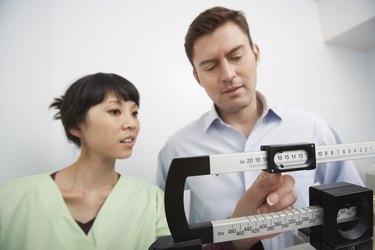
Thanks to its role in energy metabolism, vitamin B12 is often touted as a weight-loss and energy-boosting aid. B12 is an essential water-soluble vitamin found in a variety of foods, including fish, shellfish, red meat, poultry, eggs, many breakfast cereals and dairy products. It helps maintain healthy nerve and red blood cells, and is also needed to make DNA, according to the Mayo Clinic. Vitamin B12 deficiency can lead to anemia, fatigue, weakness, neurological changes (including numbness and tingling in the hands and feet), difficulty maintaining balance, depression and confusion, among other conditions, according to the National Institutes of Health.
Get Tested
Video of the Day
Step 1
Get tested to see whether your body is breaking Vitamin B12 down properly. About 50 percent of the U.S. population cannot metabolize vitamin B12 properly due to a genetic glitch, says nationally known nutritionist and bestselling author Ann Louise Gittleman, Ph.D. "It's a very individual thing," Gittleman says. "You need to figure out if you are deficient or have too much of it. Testing is important." If your body is not breaking it down properly, you'll need a supplement that will help your body utilize this important nutrient.
Video of the Day
Step 2
Prepare for a B12 test by making sure you don't eat or drink anything for six to eight hours prior to the test, according to the NIH's Office of Dietary Supplements. B12 levels are analyzed via a blood test.
Step 3
Tell your health care provider about all medicines you are taking, including over-the-counter and herbal medication. Drugs that may affect test results include colchicine, neomycin, para-aminosalicylic acid and phenytoin (Dilantin), according to the agency. When you get your results, check to see if your values are normal. Normal values are 200 to 900pg/mL (picograms per milliliter). Normal value ranges may vary slightly among different laboratories That's why it's important to talk to your doctor about what your specific test results mean, according to the agency.
Get the Right RDA
Step 1
Make sure you don't take too much B12. There is no identified tolerable upper intake level, or UL, for vitamin B12 due to its low potential for toxicity, according to NIH. However, "I wouldn't go over the recommended daily allowance. I wouldn't err on the side of too much or too little," Gittleman says. The RDA for B12 is 2.4mcg per day for adults. Those who need supplements can get them via injection or as supplements in pill, sublingual or liquid form.
Step 2
Learn to add the foods you eat into your daily allotment if you choose to take a supplement, Gittleman advises. "I'd factor in any foods I eat, such as beef, that are a rich source," she says.
Step 3
Structure your diet to get enough B12 without taking supplements. According to the Mayo Clinic, a day's supply of vitamin B12 can be obtained by eating one chicken breast plus one hard-boiled egg plus 1 cup plain low-fat yogurt, or 1 cup milk plus 1 cup raisin bran.
Tip
You can find selected sources of vitamin B 12 on the Dietary Supplement Fact Sheet published by the National Institutes of Health Office of Dietary Supplements (see Resources).
Warning
It is important not to try to self-diagnose a vitamin deficiency.